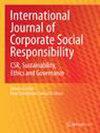Responsible government and responsible business: the challenge of harnessing CSR in a new epoch
International Journal of Corporate Social Responsibility
Pub Date : 2023-09-19
DOI:10.1186/s40991-023-00083-7
引用次数: 0
Abstract
Abstract Much has been written of the implications for government policy on ‘responsible business’ but a comprehensive review of the subject is needed. This literature review will offer an assessment of varied insights to inform academics and practitioners on an important topic in need of scrutiny. The post-war consensus and strength of collective bargaining is waning in the Western world, and an inflection point may be nearing with a new way of working. Governments leveraging responsible business is among the options, but an understanding of the risks inherent in this option available to society is crucial. The world of business is in a new epoch of accepting social responsibility and, at the same time, a crisis of inequality means there is a need for every element of society to put their shoulder to the wheel. Businesses are an extremely powerful element in society, so how should governments harness that productivity for a social purpose? Should governments be encouraging responsible business to improve living standards and rebalance the inequity of incomes, or should political leaders be wary of engaging well-resourced businesses in areas that should be controlled from a democratic mandate? This article examines responsible business by providing comprehensive coverage of the literature in this deceptively mature subject area. Insights from secondary sources are analysed in relation to four key questions to reach an understanding of the risks inherent in crafting policy that expects more from business. The literature review concludes with a focus on the policy area of education, discussing how responsible business has been put into practice to resolve a market failure identified by J. K. Galbraith in the 1940s. Identifying areas such as this will maximise the opportunity of responsible business.负责任的政府与负责任的企业:新时代企业社会责任的挑战
关于“负责任的企业”对政府政策的影响已经写了很多,但需要对这个主题进行全面的审查。这篇文献综述将提供各种见解的评估,以告知学术界和实践者需要审查的一个重要话题。战后的共识和集体谈判的力量在西方世界正在减弱,一个新的工作方式的拐点可能即将到来。政府利用负责任的企业是选项之一,但对社会可用的这一选项的内在风险的理解至关重要。商界正处于一个接受社会责任的新时代,与此同时,一场不平等的危机意味着,社会的每一个元素都需要齐心协力。企业是社会中一个极其强大的因素,那么政府应该如何利用这种生产力来实现社会目标呢?政府是应该鼓励负责任的企业提高生活水平,重新平衡收入不平等,还是政治领导人应该谨慎对待那些资源充足的企业,不让它们参与那些本应由民主授权控制的领域?本文通过在这个看似成熟的主题领域提供全面的文献覆盖来检查负责任的业务。从二手资源中获得的见解与四个关键问题相关,以了解制定对企业有更多期望的政策所固有的风险。文献综述最后将重点放在教育政策领域,讨论了负责任的企业如何被付诸实践,以解决J. K.加尔布雷斯在20世纪40年代提出的市场失灵问题。确定诸如此类的领域将使负责任的企业的机会最大化。
本文章由计算机程序翻译,如有差异,请以英文原文为准。
求助全文
约1分钟内获得全文
求助全文

 求助内容:
求助内容: 应助结果提醒方式:
应助结果提醒方式:


